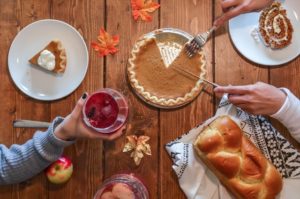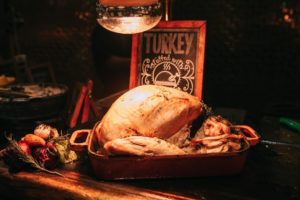As we head into the holidays, most of us will be in the kitchen more than usual. We’ll be handling high quantities of food that we don’t normally serve year-round; mixing up cookie dough, preparing seafood, and baking turkeys. No one wants a holiday meal to wreck the festivities with foodborne illness or food poisoning.

Stay vigilant this season with food safety. Be especially careful when handling:
- Undercooked or raw food from animals (such as beef, pork, chicken, turkey, eggs, or seafood)
- Raw or lightly cooked sprouts
- Unpasteurized (raw) milk and juices
- Soft cheese, unless it is made with pasteurized milk
Food safety can seriously affect your health. According to the World Health Organization, every year about 600 million people – almost 1 in 10 people in the world – fall ill after eating contaminated food, and 420,000 people die. But with a few precautions and some preparation, we can greatly reduce this danger.
The Centers for Disease Control offers these tips for a happier, healthier holiday:
- Keep it clean. Wash your hands and all work surfaces before, during, and after preparing food. Watch out for surfaces that can be harder to clean, such as cutting boards and food processors.
- Check the temperature. Food must be prepared at a temperature hot enough to kill germs that might make you ill. The only way to be certain about the internal temperature is with a food thermometer. Check this chart for a detailed list of foods and temperatures. Tip: Don’t wash meat, chicken, turkey, or eggs, as that can spread germs onto your sink or countertops. Cooking these foods thoroughly will kill harmful bacteria, viruses, fungi, and protozoa that can cause disease.
- Separate raw foods. It’s best to keep uncooked meat, eggs and seafood away from ready-to-eat foods. Use a separate cutting board, if possible. Always use separate plates for raw meat and cooked meat. Tip: Don’t eat cookie dough with raw eggs!
- Stay chill. Be sure your refrigerator is set for 40°F or below. Refrigerate leftovers within two hours of cooking (or within one hour if food is exposed to a temperature above 90°F, like in a hot car). Thaw food safely in the refrigerator or microwave, not on your counter.
- Scrub your fruits and veggies. Wash all fruits and vegetables under running water even if you’re going to peel them. Use a clean vegetable brush to scrub firm fruits and vegetables like melons and avocados.

Food poisoning feels terrible for anyone, but certain groups are more susceptible.
- Adults age 65 and older
- Children younger than age 5
- Pregnant women
- People whose immune systems are compromised
Learn more about why these groups are more likely to get sick from Salmonella, Campylobacter, Listeria, or E. coli.
How do you know if you have food poisoning? Look for these symptoms:
- High fever (temperature over 102°F, measured orally)
- Bloody stools
- Frequent vomiting that prevents keeping liquids down, which can lead to dehydration
- Diarrhea that lasts more than three days
- Dehydration, which causes symptoms such as dry mouth and throat, feeling dizzy when standing up, and little or no urination
Download the Food Poisoning: Protect Yourself and Your Family fact sheet and tape it into a cabinet for easy future referral.
Stay safe through the holidays and beyond by handling your food properly. Your friends and family will thank you!




